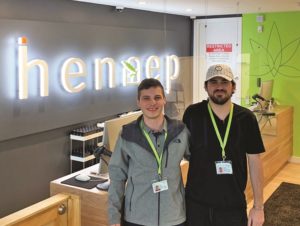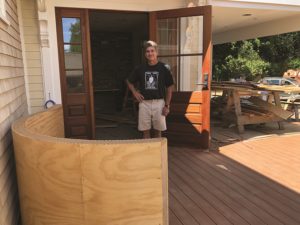PROVINCETOWN — Hennep opened its doors at 246 Commercial St. on Monday, May 3, becoming the third retail marijuana shop in Provincetown.
Owner Andrew Koudijs decided to go into the cannabis business when he was a freshman at Boston University after he and his friend Colin Noel attended a panel on the subject. While getting their undergraduate degrees, they worked on business plans, studied regulations, and waded through a complex process that has bedeviled the entire state industry. Now graduated, Koudijs and Noel moved to Provincetown over the winter.
“My connection to Provincetown is Family Week,” said Koudijs, who grew up in New York State. “My parents split when I was young. My mom is gay, and there weren’t many families like mine where we were. My brother and I came to Family Week in Provincetown at least five times.
“When I started thinking about joining this industry, the first place where I wanted to do it was Provincetown,” he continued. “I love the people, the energy — I just thought there was no better place to do this.”

Koudijs is also opening a cultivation and production facility in Franklin, right off Interstate 495. Almost every retail operation on the Outer Cape is also working on a cultivation facility or a manufacturing facility for edibles — or both. In most cases, it’s the retail shop that opens first, before the other facilities are fully licensed, which is why there’s been a scramble among dispensaries for high-quality merchandise.
“There’s not a super-wide variety of products on the market right now,” said Koudijs. “So, it’s difficult to differentiate yourself from a product standpoint. The menus will come out from the cultivators that are operating, and everything will get snatched up in 30 seconds — you’re left picking up the scraps.”
The state’s demand for rigorous product testing is another bottleneck, since there are few licensed labs. “Massachusetts just licensed their third lab, just in the last 12 months,” said Koudijs. At that original panel discussion he attended, one panelist recommended going into the lab business. “I remember Andrew looked at me and said, ‘Where’s the fun in that?’ ” Noel said.
Koudijs is the sole owner of Hennep’s retail operation, according to documents posted by the Cannabis Control Commission (CCC). The cultivation business is co-owned with his brother Alec. “It’s a family business, and family-run,” said Koudijs. “This is the only retail operation we’re doing.”
Koudijs says he was able to find housing for himself last winter, but staff housing has been a challenge. One recent location he looked at was meant for eight people, with one bathroom. “How are they supposed to get ready for work?” Koudijs asked.
The Heal Deal & Medical
Curaleaf, b/well, and Hennep may soon be joined by a fourth pot shop in Provincetown. Trish Faass, manager of Heal Provincetown, Inc. at 48 Shank Painter Road, expects her recreational pot shop to open in July and a cultivation operation in Sturbridge to be fully licensed by the fall. That could mean medical-grade marijuana will have an Outer Cape dispensary by winter.
Medical marijuana was authorized in Massachusetts in 2012, four years before recreational, or “adult-use,” marijuana. Yet the nearest source of medical-grade marijuana products is the Triple M dispensary in Mashpee.
There are several reasons for this, people in the industry say, but the primary one is that medical marijuana dispensaries are required to grow and process 55 percent of what they sell. This has led to higher costs and delays.
“It’s quite expensive to build out a cultivation and a manufacturing facility,” said Faass.
Medical-grade marijuana is significantly different from the strains found in recreational stores. For cancer patients and people with chronic pain, there are dozens of compounds in cannabis that are thought to be bioactive and medicinal.
“You’re looking for the entourage effect — the benefits of the whole plant, without stripping out the terpenes and leaving just THC to get high,” said Faass. Terpenes are aromatic compounds found in plants such as lavender, rosemary, and lemon peel that are especially concentrated in high-quality cannabis. Medical patients will seek out the strain that works best for their condition, according to Faass.
Another likely reason the Outer Cape has been slow to get medical marijuana is the size of the tourist market, making recreational a priority. Large operators, such as Curaleaf, are capped at three recreational outlets and three medical outlets statewide; the medical ones tend to be located closer to metropolitan centers.
“We think there are a lot of people who come out here more than just one week a year,” said Faass. “We’ll make a push to convert some of those medical users to our location.”

